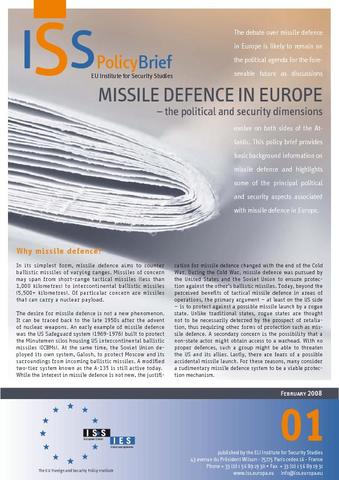You are here
Missile Defence in Europe: the political and security dimensions

The debate over missile defence in Europe is likely to remain on the political agenda for the foreseeable future as discussions evolve on both sides of the Atlantic. This policy brief provides basic background information on missile defence and highlights some of the principal political and security aspects associated with missile defence in Europe. Why missile defence? In its simplest form, missile defence aims to counter ballistic missiles of varying ranges. Missiles of concern may span from short-range tactical missiles (less than 1,000 kilometres) to intercontinental ballistic missiles (5,500+ kilometres). Of particular concern are missiles that can carry a nuclear payload. The desire for missile defence is not a new phenomenon. It can be traced back to the late 1950s after the advent of nuclear weapons. An early example of missile defence was the US Safeguard system (1969-1976) built to protect the Minutemen silos housing US intercontinental ballistic missiles (ICBMs). At the same time, the Soviet Union deployed its own system, Galosh, to protect Moscow and its surroundings from incoming ballistic missiles. A modified two-tier system known as the A-135 is still active today. While the interest in missile defence is not new, the justification for missile defence changed with the end of the Cold War. During the Cold War, missile defence was pursued by the United States and the Soviet Union to ensure protection against the other’s ballistic missiles. Today, beyond the perceived benefits of tactical missile defence in areas of operations, the primary argument – at least on the US side – is to protect against a possible missile launch by a rogue state. Unlike traditional states, rogue states are thought not to be necessarily deterred by the prospect of retaliation, thus requiring other forms of protection such as missile defence. A secondary concern is the possibility that a non-state actor might obtain access to a warhead. With no proper defences, such a group might be able to threaten the US and its allies. Lastly, there are fears of a possible accidental missile launch. For these reasons, many consider a rudimentary missile defence system to be a viable protection mechanism.